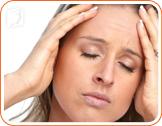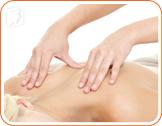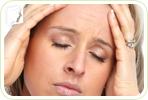Aspirin is often a go-to solution for headaches, but some women get headaches during menopause that may require more than an over-the-counter painkiller to subdue. Women tend to get more headaches during menopause, and there are different treatments available to soothe them.
What Are Menopausal Headaches?

Menopausal headaches are typically related to the body's estrogen levels. It is thought that the lower the level of estrogen, the worse menopausal headaches tend to be. As a result, when a woman goes through menopause - a process in which estrogen fluctuates and decreases overall - the severity of headaches may increase. Research shows that menopause can also increase the frequency and severity of migraines in some women.
What Are Some Typical Headache Remedies?
Each woman is different in terms of what remedies work for her. Below are some of the most common treatments for headaches.
- Exercise. Regular exercise helps the body cope with pain and may be especially effective for women suffering from migraines.

- Massage. Massages stimulate and relax the body. Massages can also help release stress and give a woman time to meditate and find peace.
- Hot and cold. For some women with menopausal headaches, applying a cold pack may help ease the pain, while for others, a heat pack will be beneficial. Try a cold pack wrapped in a towel on your neck or head.
- Medication. Hormone replacement therapy, triptans, non-steroidal anti-inflammatory drugs, magnesium, aspirin, and ergots are all medicines that can stop or treat a migraine. Talk to your doctor about what option is best for you.
What Can I Do about Headaches during Menopause?
There is a diverse range of treatments for menopause headaches. These treatments can include biofeedback, sticking to a regular sleep schedule, and avoiding foods that may trigger migraines. Alcohol and chocolate, for example, are substances that can trigger migraines in some people. Other triggers include stress and exhaustion.

Relaxation therapies - such as deep breathing techniques, yoga, and meditation - also have proven benefits. There is a wide range of treatments available to treat headaches and migraines, but treatments do not always work the same for everyone. It is important to talk to your doctor about getting treatment if headaches are lowering the quality of your life.
Sources
- Department of Health and Human Services.(n.d)."Migraines".Retrieved from www.womenshealth.gov.
- Dr. Lichten, Edward. "Menopausal migraine: The Role of Hormonal Replacement." The Menopausal Syndrome. Scottsdale, Arizona January 27, 1990. Reid-Rowell, Inc. Pages 21-24
- Mayo Clinic.(n.d)."Migraines."Retrieved from www.mayoclinic.com.



